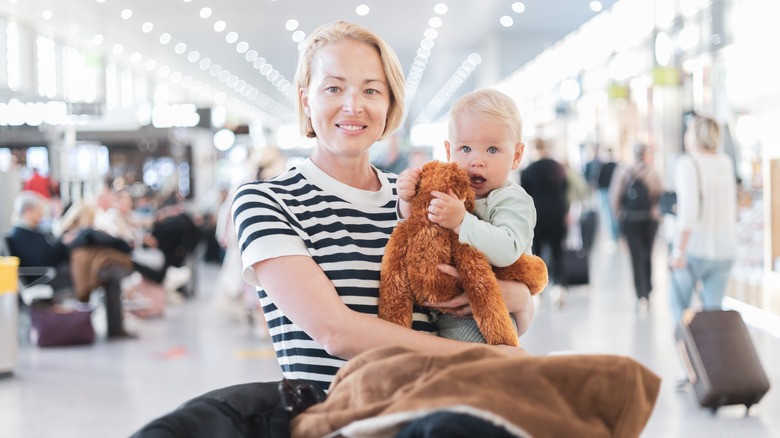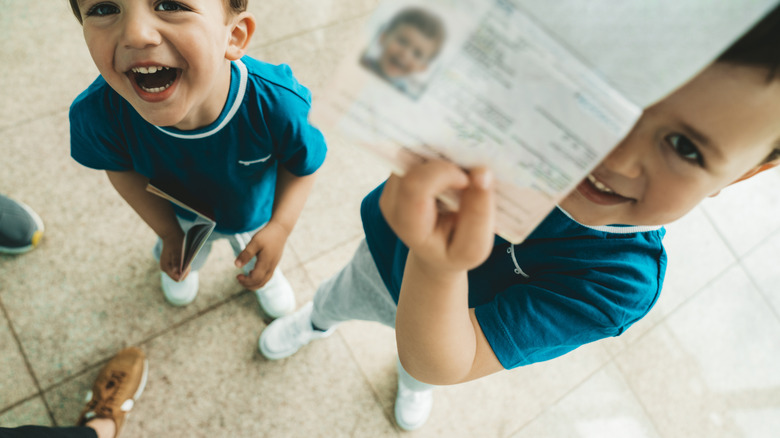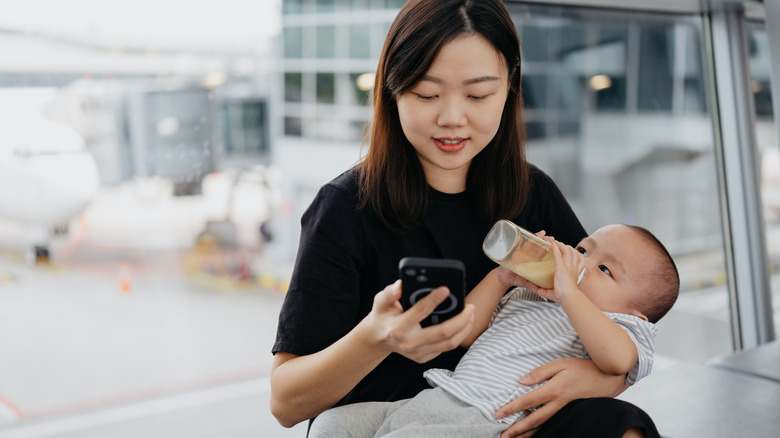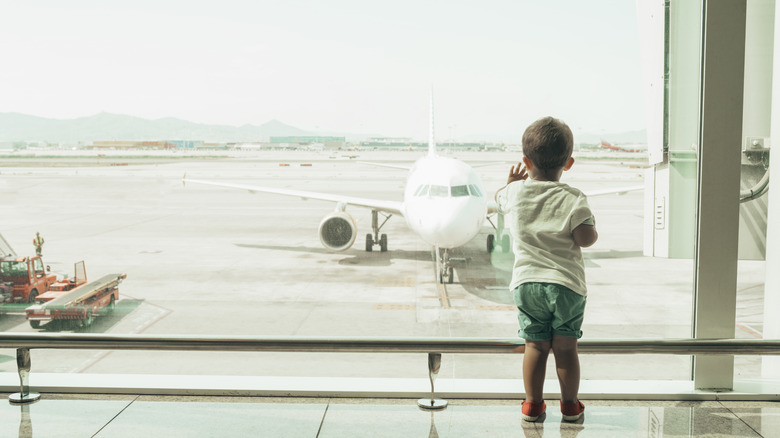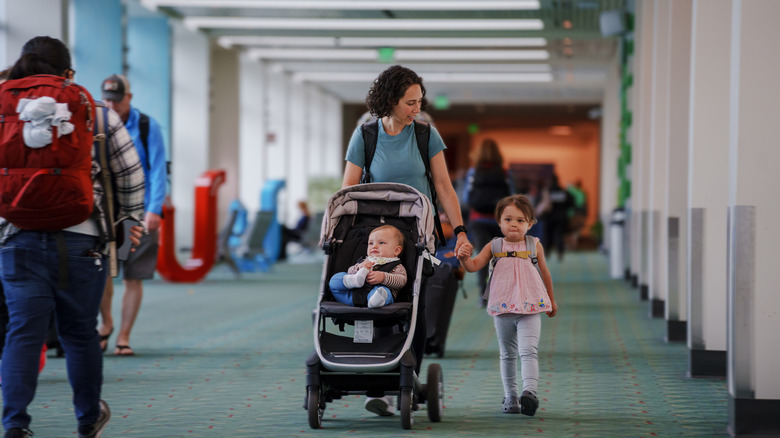How To Make Going Through TSA With A Baby Even Easier
If you've ever had to navigate an airport terminal or deal with an airline after your flight gets canceled, you can probably agree that traveling — although exhilarating — can be pretty stressful. From the long lines to the questionable airport food and the unpredictability of fellow passengers — all of which should be enough to send even the most seasoned travelers into a spin — it's as if the challenges of trying to fly somewhere never end. Then there's the added stress of dealing with the TSA. With stringent procedures and protocols, it's important to be prepared to deal with even the most unexpected request. Throw a baby into the mix, and the entire process starts to sound like a recipe for disaster.
Even though TSA agents are there to ensure everyone's safety — including your baby's — when you're already juggling passports, tickets, and a wriggly infant, the simplest task can often feel like a steep mountain to climb.
Luckily, though, there are several tips and tricks that can make the process more manageable. And with a bit of preparation, you can easily strategize your approach to help you navigate airport security faster — even with a fussy baby in tow.
Prepare your travel documents ahead of time
Navigating the airport with a baby demands additional preparation. Even though children under 18 don't need to present their ID for domestic flights, it's always best to have your baby's birth certificate or passport handy just in case the question of their age does come up once you're at the gate. Let's be honest: You never want to be in a situation where you're scrambling for documents while your baby is crying their eyes out and demanding a bottle.
Additionally, if you're a frequent traveler, you can also consider signing up for TSA PreCheck to make things easier for you and your family at security. For a fee of $78, the program streamlines the TSA process and allows you to breeze through an expedited security lane without removing your shoes or unpacking any liquids or laptops. Better yet, children under 12 can also make use of the service and accompany their parent or guardian through the PreCheck lane without any restriction. For children 13 through 17, there must be a note on their boarding pass that indicates TSA PreCheck.
Look into the TSA's liquid rules
It's no secret that navigating TSA liquid rules can sometimes be confusing — even more so when you're traveling with a baby. However, the good news is that the TSA is generally more lenient when it comes to baby essentials. In terms of bringing food through TSA — specifically baby formula, breast milk, and even juice — parents are allowed to pack and carry quantities beyond the 3.4 oz limit that applies to other items such as toiletries, perfumes, lotions, and beverages.
As a helpful tip, TSA also suggests that you carry formula and breastmilk in clear bottles (not bags) so that they can be easily checked through the specialized Bottle Liquid Scanners. Don't worry, though, the agent won't insert anything into the bottle that might contaminate it. Thinking of packing baby food too? Pouches are your best friend — and they're also much more convenient than jars during the actual flight.
Whatever you choose to pack, make sure you always declare these items to a TSA officer at security — especially if they exceed the 3.4 oz rule.
Dress for success
TSA is notoriously picky when it comes to its screening processes, and there's a long list of things that TSA agents seriously despise having to deal with — from buckles and long laces, to oversized clothing and hairpins. So avoid dressing your baby in clothing with metal snaps or other types of accessories that might set off the metal detector. At the same time, make sure your clothing is free of any unnecessary metal bits that might lead to extra screening. At the end of the day, the simpler you and your baby's outfits, the quicker and more straightforward the security process will be.
As for footwear, wearing slip-on shoes can speed up the process — especially if you don't have TSA PreCheck — and will also save you the trouble of fumbling around with shoelaces while holding your baby. Additionally, TSA guidelines outline that parents are allowed to carry infants through the metal detector using a sling, soft carrier, or in their arms. Strollers, however, as well as car seats and backpacks, must go through separate screening and can't be walked through.
Look out for the family lane
Nowadays, many airports offer a solution to make the process of bringing your baby along for the ride a little bit easier: the family lane. Specially designed for parents traveling with children or infants, the dedicated family lane slows the pace down a notch. It also provides extra support for the needs and challenges that come with young passengers. Additionally, the family lane is typically more spacious — meaning you don't have to worry about loading and unloading a bulky stroller while a stressed-out traveler taps their heel behind you.
Keep in mind, however, that these lanes aren't always easy to distinguish from the rest. If you can't find a dedicated family lane on your own, don't be afraid to ask airport staff for a little guidance. If there is no dedicated lane, ask airport security if there's anything they can do to help you navigate or expedite the process.
Keep calm and travel on
When navigating airport security with a baby, your mindset plays a pivotal role. Staying calm, being prepared, and keeping all of your belongings organized are essential for a smooth experience. So while TSA rules and checkpoints might be unpredictable, your reaction to them doesn't have to be. Even if it feels challenging, maintaining your composure can mean the difference between a streamlined TSA interaction and a drawn-out, stressful one.
If you or your things require additional screening, stay composed and politely ask for details on what's needed and how you can help. Whatever you do, avoid confrontations or heated discussions — these aren't productive and might even prolong the process. In fact, interfering or arguing with a TSA agent can actually land you in some pretty hot water — including a fee of up to $5,000. Keep in mind that every TSA agent has their own unique approach, which means that what's routine for one might be different for another, so it's always best to approach each interaction with an open mind.
Whether you and your family travel frequently or are hitting the skies on your first trip with a little one, following these guidelines can help simplify the process of navigating airport security with a baby — making the experience a lot less daunting and a lot more breezy.
